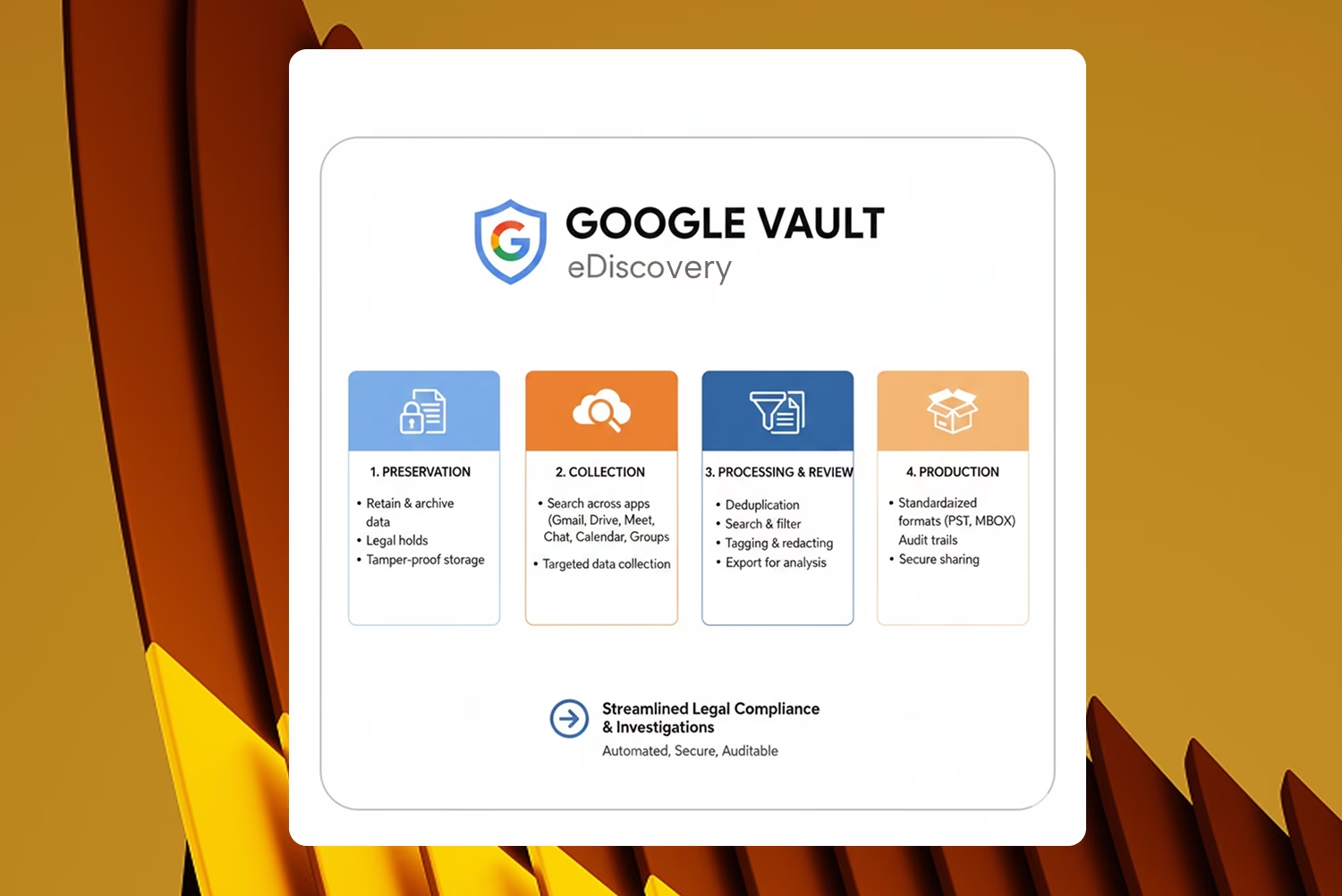Organizations using Slack for workplace communication face a growing challenge: how to manage Slack data for eDiscovery, compliance, and legal holds. Slack's native tools are limited, especially when it comes to searching, preserving, and producing messages for legal review.
This guide evaluates the top 5 Slack eDiscovery tools in 2025, helping legal teams, IT administrators, and compliance officers choose the right solution.
What Is Slack eDiscovery?
Slack eDiscovery refers to the process of identifying, preserving, collecting, and reviewing Slack messages, files, and metadata for legal proceedings, regulatory investigations, or internal compliance.
Key challenges:
- Slack's native export is in JSON format (not human-readable)
- No built-in search across exported data
- Limited options for legal holds on Free/Pro plans
- Difficulty integrating with traditional eDiscovery platforms
That's where third-party Slack eDiscovery tools come in.
Using These Tools for Subpoena Response
Many organizations first encounter Slack eDiscovery when responding to a subpoena or court order. If you've received a legal request for Slack data, you'll need tools to process raw JSON exports, review messages for responsiveness, and produce data in court-accepted formats. See our Slack subpoena response guide for the complete process, including tool selection criteria, cost estimates, and production workflows.
Evaluation Criteria
We evaluated tools based on:
- Search capabilities: Can you search messages by keyword, date, user, channel?
- Legal hold support: Can you preserve data that can't be deleted?
- Export formats: Does it export to PST, CSV, PDF, or native Slack format?
- Integration: Does it work with Relativity, Everlaw, or other review platforms?
- Compliance features: Audit logs, retention policies, encryption
- Pricing: Transparent, per-user, or enterprise-only?
- Ease of use: Can non-technical users operate it?
Top 5 Slack eDiscovery Tools (2025)
1. ViewExport
Best for: Fast Slack searches, SMBs to enterprises, and teams that need instant results without complex setup
Key features:
- Lightning-fast search across Slack exports (keyword, date, user, channel)
- Supports all Slack plans (Free, Pro, Business+, Enterprise Grid)
- Export to PDF, CSV, or native JSON
- No per-user licensing (flat workspace pricing)
- Simple upload of Slack JSON exports—no API connection required
- Legal hold support for compliance
- Works with Slack exports and eDiscovery workflows
Pricing:
- Starts at $250/month per workspace
- No per-user fees
- Free trial available
Pros:
- Fastest Slack search tool on the market
- No complex API setup—just upload and search
- Affordable for small and mid-sized teams
- Clean, intuitive interface
Cons:
- Focuses exclusively on Slack (doesn't handle Microsoft Teams or email)
Verdict: If you need a dedicated Slack eDiscovery tool that's fast, affordable, and easy to use, ViewExport is the top choice.
👉 Try ViewExport
2. Onna
Best for: Large enterprises managing multiple data sources (Slack, Teams, Google Workspace, etc.)
Key features:
- Centralized platform for multi-source eDiscovery (Slack, Microsoft Teams, Google Workspace, Zoom, etc.)
- Real-time data collection via API
- Advanced search and filtering
- Integration with Relativity, Everlaw, and other review platforms
- Strong compliance and governance tools
Pricing:
- Enterprise-only (starts at ~$50,000+/year)
- Requires sales consultation
Pros:
- Handles Slack + other platforms (Teams, email, etc.)
- Enterprise-grade compliance features
- Strong for large-scale litigation
Cons:
- Very expensive (not suitable for SMBs)
- Complex setup and onboarding
- Overkill if you only need Slack
Verdict: Great for Fortune 500 companies with multi-platform eDiscovery needs, but too expensive and complex for smaller organizations.
3. Hanzo
Best for: Organizations needing real-time Slack monitoring and archiving
Key features:
- Real-time Slack archiving (captures messages as they're sent)
- Legal hold capabilities
- Search and export for eDiscovery
- Compliance reporting
- Supports Slack, Teams, and other platforms
Pricing:
- Custom pricing (typically mid-market to enterprise)
- Per-user or per-workspace licensing
Pros:
- Real-time capture (no risk of missing deleted messages)
- Strong for regulated industries (finance, healthcare)
Cons:
- Requires ongoing subscription (can get expensive)
- Less intuitive than ViewExport for basic searches
Verdict: Best for highly regulated industries that need continuous archiving, but overkill for one-off eDiscovery projects.
4. Smarsh
Best for: Financial services and healthcare organizations with strict compliance needs
Key features:
- Continuous Slack archiving for compliance
- Legal hold and retention policies
- Integration with review platforms
- Supports Slack, Teams, email, social media, and more
Pricing:
- Enterprise pricing (starts at ~$30,000+/year)
- Per-user licensing
Pros:
- Designed for heavily regulated industries
- Strong compliance and audit features
Cons:
- Expensive and complex
- Long implementation timelines
- Not ideal for ad-hoc eDiscovery
Verdict: A compliance-first solution for enterprises, but not the best choice for teams focused on Slack-specific eDiscovery.
5. Relativity (with Slack Connector)
Best for: Law firms and corporations already using Relativity for eDiscovery
Key features:
- Integrates Slack data into Relativity workflows
- Advanced analytics, TAR, and review tools
- Strong for large-scale litigation
Pricing:
- Very expensive (Relativity licensing + Slack connector fees)
- Typically $100,000+/year
Pros:
- Best-in-class eDiscovery platform
- Perfect if you're already using Relativity
Cons:
- Massive overkill for Slack-only needs
- Requires Relativity expertise
- Extremely expensive
Verdict: Only makes sense if you're already a Relativity user and need to add Slack to your existing workflows.
Comparison Table
| Tool |
Best For |
Pricing |
Ease of Use |
Slack-Only? |
| ViewExport |
SMBs to enterprises, fast Slack searches |
$250/month |
⭐⭐⭐⭐⭐ |
Yes |
| Onna |
Large enterprises, multi-platform |
$50,000+/year |
⭐⭐⭐ |
No |
| Hanzo |
Real-time archiving, compliance |
Custom |
⭐⭐⭐⭐ |
No |
| Smarsh |
Financial services, healthcare |
$30,000+/year |
⭐⭐⭐ |
No |
| Relativity |
Law firms using Relativity |
$100,000+/year |
⭐⭐ |
No |
How to Choose the Right Tool
Ask yourself:
- Do we only need Slack eDiscovery, or multiple platforms?
- Slack-only → ViewExport
- Multi-platform → Onna, Smarsh, or Relativity
- What's our budget?
- Under $10k/year → ViewExport
- $10k-$50k/year → Hanzo
- $50k+/year → Onna, Smarsh, Relativity
- Do we need real-time archiving or can we work with exports?
- Real-time → Hanzo, Smarsh
- Export-based → ViewExport
- How often do we run eDiscovery projects?
- Ad-hoc/occasional → ViewExport
- Continuous → Onna, Hanzo, Smarsh
Why ViewExport Stands Out
For most organizations, ViewExport is the best Slack eDiscovery tool because:
- Speed: Search millions of Slack messages in seconds
- Affordability: $250/month vs. $30k-$100k+ for enterprise platforms
- Simplicity: No API setup, no complex integrations—just upload and search
- Slack-focused: Purpose-built for Slack (not a bloated multi-platform tool)
- No per-user fees: Perfect for scaling teams
If you're spending hours searching Slack exports or paying tens of thousands for overkill enterprise platforms, try ViewExport.
Final Verdict
Here's the bottom line:
- Best overall Slack eDiscovery tool: ViewExport
- Best for multi-platform needs: Onna
- Best for real-time archiving: Hanzo
- Best for financial services: Smarsh
- Best if already using Relativity: Relativity + Slack Connector
For 95% of teams, ViewExport is the fastest, most affordable, and easiest solution.
👉 Start your free trial


.avif)


